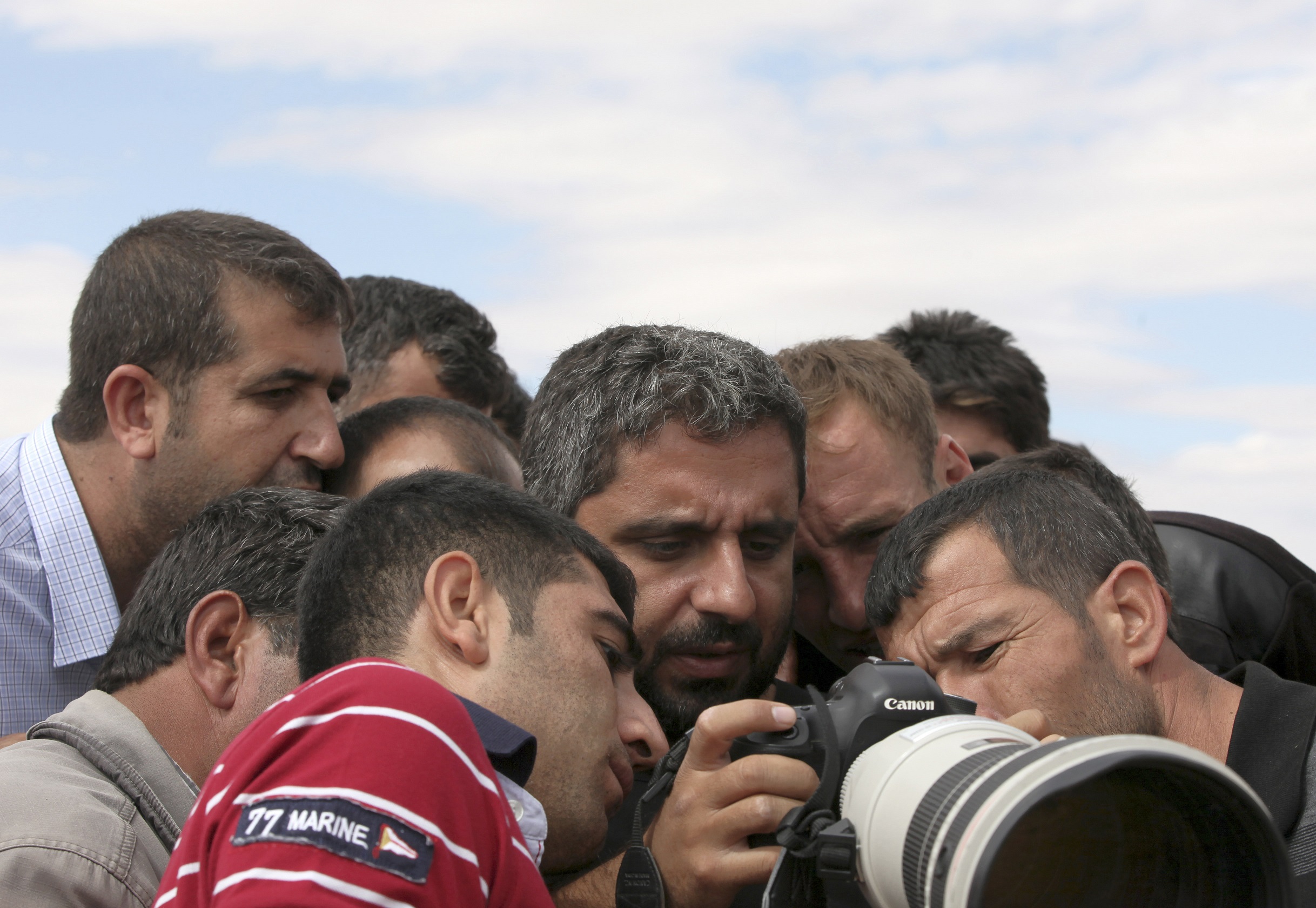اتسعت رقعة تغطية الأحداث المتعلقة باللاجئين عالميا، وما زالت أخبارهم تتصدر نشرات الأخبار فيما يهم تطورات حياتهم ومتطلباتها، أمام انعدام حلول حقيقية لاستقرارهم والعودة إلى بلادهم. ليس هذا فحسب، بل فُتحت ملفات لجوء جديدة، من بعد استلام حركة طالبان حكم البلاد إثر انسحاب القوات العسكرية الأمريكية.
عربيا، ما زالت قضية اللاجئين السوريين تتصدر المتابعة الإعلامية، وتبعات توزعهم في دول اللجوء، وكذلك القوانين المتعلقة بهم وما يطرأ عليها من تحديثات لا تتوقف، وهذا ما يحدث مع اللاجئين في دول عربية أخرى كالعراق واليمن وليبيا ومصر، وثمة ملف اللاجئين الفلسطينيين الذي لم يُغلق منذ 73 عاما.
وقد استدعى ارتفاع أعداد اللاجئين، والذين يبلغ عددهم أكثر من 82.4 مليون شخص حول العالم، إلى تنظيم كل ما يتعلق بهم على المستوى العالمي والإقليمي، وإصدار قوانين ناظمة تحت مظلة التشريعات الدولية والمحلية التي تحمي حقوق الإنسان، وعدم تعريض حياتهم إلى أي نوع من المخاطر، بالإضافة إلى التقيد بقواعد السلامة المهنية، واحترام القوانين السارية في منطقة التغطية الصحفية لصالح مختلف أشكال الوسائل الصحفية المكتوبة والمسموعة والمرئية والرقمية.
لكن كيف يستطيع الصحفي أن يغطي قضايا اللجوء دون أن يتخطى حدود القانون؟ وما المعلومات القانونية التي يجب الاطلاع عليها؟
المعرفة بالحد الأدنى من قانون اللجوء
يجد المحامي عباس الموسى أنه من الطبيعي جدا امتلاك الصحفي "الحد الأدنى من قانون اللجوء" في دولة ما عند تغطية أي قضية تخص طالب لجوء، موضحا أنه "لا يُتطَلَّب من الصحفي بالضرورة التخصص، بل من البديهي أن يعلم باتفاقية اللجوء لعام 1951، والبروتوكول المكمل لها المتعلق بالنطاق الجغرافي 1967، وكذلك المواد المتعلقة باللجوء في الإعلان العالمي لحقوق الإنسان".
ولا ينبغي أن تنحصر الثقافة القانونية عند هذا الحد، كما يرى الموسى، إنما هناك مستوى آخر يُنظر إليه، وهو الإجراءات المتبعة في الدولة المعنية التي تم تقديم اللجوء إليها؛ "فمثلا، الاتحاد الأوروبي لديه العديد من الإجراءات العامة المتفق عليها بناء على اتفاقية اللاجئين لعام 1951 وبروتوكولها المكمل، وكذلك لدى كل دولة إجراءات خاصة بها... كل ذلك يجب أن يلم به الصحفي؛ حتى تتشكل لديه أرضية لتناول قضايا اللجوء".
يتفق مدير موقع فرانس بالعربي المحامي زيد العظم مع الموسى، ويرى أن أهم قانونين ينظمان الهجرة واللجوء في العالم هما: اتفاقية الأمم المتحدة الخاصة بوضع اللاجئين لسنة 1951 بجنيف، والبروتوكول المكمل لها بنيويورك لسنة 1967 م، كما أنه يتوجب على "الصحفي والقانوني الاطلاع عليهما وبناء تبويب ذهني ليشكلا مرجعا عند القيام بأي تغطية للاجئين".
مسؤولية من؟
ويبين العظم أن ضعف معرفة الصحفي بالقانون تعود لطبيعة الثقافة القانونية في العالم العربي التي يصفها بأنها "ضحلة وقليلة"، لكن لا يُعد ذلك مبررا عند تغطيته قضايا اللجوء، بل "يتوجب عليه تثقيف نفسه قانونيا؛ من خلال قراءته للقوانين والاطلاع عليها ومتابعة تحديثاتها".
كما يدعو العظم المؤسسات الصحفية؛ خاصة الكبرى منها، إلى "تنظيم ندوات تدريبية تثقيفية من مصادرها المختلفة للصحفيين، والتركيز على المؤسسات ذات التمويل العالي؛ كي يصبح لدى الصحفي إلمام بأهم القوانين التي تنظم اللجوء واللاجئين".
قلة اهتمام
من ناحية أخرى، رصد المحامي عباس الموسى ما يقوله بعض الصحفيين عن أسباب قلة اهتمامهم بالمعرفة القانونية حول قوانين اللجوء بأنها " "ليست من اختصاص الصحفي بل من اختصاص القانونيين فقط"، لكن الموسى يؤكد بأن هذه الحجة "لا تعفي الصحفي من التفقه بالنصوص القانونية؛ لأنها ستساعده في تجويد قصصه الصحفية".
و الموسى أن أي قصور في فهم قانون اللجوء سيوقع الصحفي بمشاكل من حيث "المصداقية في تغطية قضية لجوء ما، وربما قد يقع بالمحظورات في نقل أخبار مغلوطة بسبب هذا النقص في الفهم القانوني".
ويسوق الموسى مثالا على الأخطاء التي قد تواجه الصحفيين عن تغطية أخبار اللجوء لقلة اطلاعهم على النصوص القانونية قائلا: "قصة صحفي أراد كتابة مقال عن معاناة عائلة رُفض طلب لجوئها في هولندا لأنه سبق أن وقّعت على طلب لجوء في فرنسا، ووجد الصحفي أن هذا يمثل إجحافا بحقها، لكنه لو عاد للقانون الأوروبي بهذا الخصوص، فسيعلم أن هذا الإجراء طبيعي ومتفق عليه بين دول الاتحاد الأوروبي".
تتكرر هذه الأخطاء عند الصحفيين حسب العظم؛ "فأحد الصحفيين قال إن موقف فرنسا مثل الدنمارك، تجاه فكرة اعتبار أن دمشق مدينة آمنة، وقد قال ذلك بالقياس على إحدى قضايا اللجوء لشخص معين، لكن تبيّنت حقيقة الأمر، عندما طلب أحد السوريين (المؤيدين للأسد) اللجوء بعد أن عاش السنوات العشر الأخيرة في دمشق، فكيف يطلب اللجوء في الوقت الحالي وقد عاش في شدة الأحداث في سوريا؟ في هذه الحالة اعتبرت فرنسا بأن مدينة دمشق آمنة بالنسبة لهذه الحالة فقط وليس بالعموم، إذن هناك تفاصيل قانونية يجب أن يعرفها الصحفي حتى يتحدث بالدقة اللازمة".
ما هي اتفاقية الأمم المتحدة جنيف 1951 وبروتوكولها المكمّل 1967؟
يُعرِّف موقع المفوضية السامية للأمم المتحدة لشؤون اللاجئين (UNHCR) اتفاقية الأمم المتحدة الخاصة بوضع اللاجئين لعام 1951 في جنيف والبروتوكول المكمل لها في نيويورك لعام 1967 بالتالي:
اتفاقية عام 1951 الخاصة بوضع اللاجئ وبروتوكولها للعام 1967 هما الوثيقتان القانونيتان الأساسيتان اللتان تشكلان جوهر عملنا. مع وجود 149 دولة طرفا في أي من الاتفاقية والبروتوكول أو في كليهما، فإنهم يعرّفون مصطلح ""اللاجئ ويحددون حقوق اللاجئين، فضلاً عن الالتزامات القانونية للدول بتوفير الحماية لهم.
ويتمثل المبدأ الأساسي في عدم الإعادة القسرية إلى بلد يمكن أن يواجه فيه تهديدا خطيرا لحياته أو حريته. ويُعد ذلك الآن قاعدة من قواعد القانون الدولي العرفي.
وتعمل المفوضية بصفتها "الوصي" على اتفاقية 1951 وبروتوكولها للعام 1967. ووفقا للتشريعات، من المفترض أن تتعاون الدول معنا لضمان احترام وحماية حقوق اللاجئين.
المصادر:
https://www.unhcr.org/ar/5355f64e6.html














![Palestinian journalists attempt to connect to the internet using their phones in Rafah on the southern Gaza Strip. [Said Khatib/AFP]](/sites/default/files/ajr/2025/34962UB-highres-1705225575%20Large.jpeg)


























